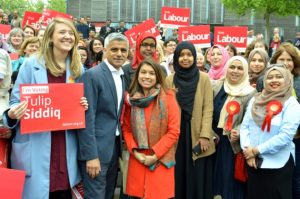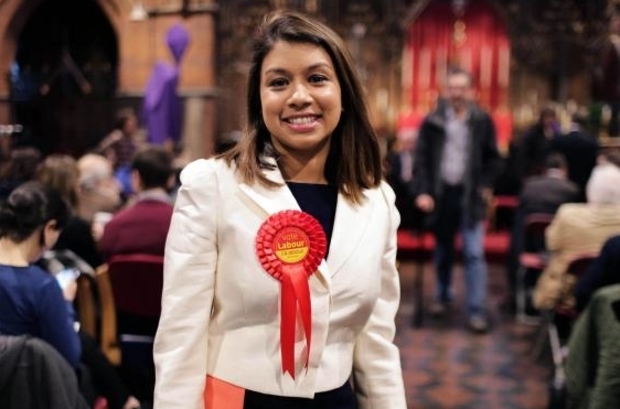Sophie Nevrkla interviews the Labour MP for Hampstead and Kilburn about the state of the party in the wake of the 2017 election result.
SN: You joined the Labour Party when you were 16, which would have been when Tony Blair was leader. What made you join the party?
TS: That’s right – my MP was Glenda Jackson, who I eventually replaced, and the leader was Tony Blair. I joined the Labour Party because my father had a stroke when I was quite young, but we lived in Singapore at the time (though I was born here, and obviously eventually came back). It was a real eye opener for me to come here and have the NHS, which helped my father so much. But I also joined the party because of how diverse it was. I was growing up in Hampstead in the late 90s, which was a very Jewish community; across the road was Kilburn, which was very Irish; and not far from there was Gospel Oak, which was very Somali at the time. The Labour Party was the only party that really reflected the diversity of my community: they had more women than any other party, they had people like Diane Abbott which other parties did not have at the time, and they had more Jewish MPs. The diversity was important to me because I could relate to it: I could see people who looked like me on screen. The other parties – which are better now, in terms of representation and diversity – were not at the time. So the NHS played a big role, as did diversity. But bear in mind that my background is Bangladeshi, and politics really matters in Bangladesh. It plays an everyday role in your life: you wake up and you can’t go to school, for example, because the opposition are striking. It’s not the same here. Bangladesh is still a relatively young country – it’s only been alive since 1971. Voter turnout is incredibly high there – people can’t wait to vote! In Bangladesh, an election is an exciting time to look forward to. Politicians don’t really have to go door knocking and remind people to vote – people just do! They campaign in other ways, they have rallies for instance, and highlight particularly contentious issues – but there are no door to door reminders, because everyone knows it’s election day. I grew up in a house where people were very lefty, socialist, political – so it was a natural move for me to join the party.
SN: It’s hard to know how to cultivate a similar atmosphere over here…
TS: Well it happened this time! Though perhaps not to quite the same extent. But West Hampstead, where we’re sitting now, had one of the highest turnouts in the entire country – I think it was over 80%.
SN: And it was previously one of the most marginal seats in the country?
TS: So in 2015 I think it was the most marginal ward and the most marginal seat. I took over a seat which had a 42 vote majority, and West Hampstead had been a very marginal ward as well. Not anymore – but it is a ward which has a very transitional population. People come and go, a lot of residents here are renters. Roughly 33% of the population in this constituency are renters, which makes it one of the biggest renting areas in London, or even in the country. West Hampstead is notorious for being a renting area. Because of the high level of people who come and go away, you can never quite predict if its going to be Labour, Tory or Lib Dem. So places like Hampstead or Frognal for instance, pretty much always have Tory counsellors, and the voter turnout is always Tory there; Kilburn is usually Labour. West Hampstead is impossible to pin down – it’s very unique, and it changes a lot from election to election.

SN: It’s quite an affluent area, there are a lot of young professionals – and for that reason there are a lot of floating voters. When I was door knocking, it was interesting to see how politically engaged the people living here are – everyone had an opinion, and those opinions were usually very well informed and nuanced. It seems, therefore, that local residents change their voting habits quite frequently, depending on how each party’s manifesto changes from election to election.
TS: Well, no one is without an opinion in Hampstead and Kilburn, I can tell you that! I’m always really impressed and surprised by the level of detail my constituents know about me. I’ll be on the bus, and someone will recognise me, and ask me how my daughter Azalea is doing. They’ll know her name – Azalea is not an easy name! The fact that an elderly man will know my daughter’s name, and will ask me ‘How’s Chris doing?’ (my husband) – that’s extraordinary. They know stuff about me – I find it quite intriguing, the fact that they’re so engaged and aware of me as an individual. They really care who is representing them. It’s an amazing constituency to represent, for that reason, especially because I grew up here and have lived here for so long.
SN: A lot of people have a more alienated relationship with their constituents, I think – yours seems to function more personally.
TS: Well just before I met you, I was upstairs doing my surgery, and every case is different. Many of my cases tend to be about housing, but today there was one about dementia and the closure of Netherwood Centre; there were two people who had been evacuated from Chalcot Estate; another person came to talk to me about their three children who have special needs. The door is always open, and people can come to talk to me about any issues they might have. I may not always be able to provide the immediate solution, but I can write on your behalf. It’s hard being an MP, because people come in and sometimes expect you to solve their problems in 15 minutes at a surgery. I don’t have all the power in the world! So sometimes you will inevitably fail, as a politician, as people’s expectations are so high.
SN: I think the general level of political engagement of your constituents means that their expectations are high: they’re fairly aware of what’s going on politically, even at a local level.
TS: I think it’s also because in 2010 (just seven years ago!) Glenda Jackson only won by 42 votes – the Tories were just 42 votes behind and the Lib Dems were only 600 or 700 votes behind. The results were so close, and the campaign was very intense; people became very politicised in that campaign, because they realised that every vote for me counts. I remember when the results came in, and in the room I was in there were about 42 people – we looked round and thought ‘we made the difference’. That’s a really big feeling, to know you’ve kept a Labour MP in! Whereas in other seats, some MPs have a 40,000 majority for example. In those situations, it makes virtually no difference how you vote, because that MP is almost certainly going to win anyway. As an MP, though campaigning can be tough, election time is the most exciting time of your life.

SN: This election, in a sense, felt more political than others: Theresa May and Jeremy Corbyn are both such ideological politicians, in their own wildly divergent ways.
TS: I think the reason why young people were more politicised in this election than ever before, was because of Brexit. So many young people didn’t vote in the EU referendum, and then they woke up and realised their future was at risk. Young people are the ones who are going to be messed around, and have their opportunities jeopardised. And then across the ocean, we saw Donald Trump: that is what happens when you don’t vote – people like him get in. I think those factors really energised people into getting out to vote in the recent June election. Organisations like Momentum also did an amazing job – I have never seen anything like it in my life. We had 1000 people out there campaigning on election day, whereas the Tories had 100, I think.
SN: Momentum ran a really helpful website called ‘My Nearest Marginal’…
TS: Yes, that was really useful – that helped me a lot. People in committee rooms said to me that they were having to turn people away because there were literally too many people turning up to campaign! That’s a lot of credit to Jeremy – he’s managed to galvanise a lot of people, especially young people.
SN: Why do you think young people like him quite as much as they do?
TS: I think the number one reason is that Jeremy is authentic, and that really helps. Politicians are always so full of jargon: they have obscure terminology that they use, and they just avoid questions and don’t give straight answers. I like to think of myself as straight talking, and I really hope that I don’t turn into one of those – but you see Jeremy on TV, and he just talks normally. It’s really important that politicians talk that way. Also, the manifesto was really important to people. It wasn’t just about the ‘no tuition fees’ thing – more generally, he was paying attention to young people for the first time, when they’ve been ignored for so long. Politicians have always made policies with their eyes on the ballot box, and that’s why a lot of policies are targeted towards helping older people. Why do you think things like educational maintenance allowance was cut? That’s because young people don’t vote, and so therefore politicians know that they don’t need to target them when making policy. Jeremy actually treated young people with respect; not just Jeremy, but the whole Labour party realised the need to cater to young people, especially post-Brexit. Austerity is hitting young people the hardest. For example, the fact that the Tories made no protection for tenants in their manifesto – a lot of young people are tenants, and that was really off putting for them. But if the Tories ever put forward any useful ideas for young people in Parliament, we would definitely support them. I think that’s one of the points that I should make completely clear – people always think we are very partisan and only support ideas put forward by our party, but if the Tories were to come up with a good idea, then we would definitely help them. For example, I recently called for an inquiry into the online abuse of politicians, and the Tories have actually announced that they are going to look into that. I welcomed that – I’m not going to sit here and criticise the government when they do something right. Unfortunately, they don’t usually give me much to work with!
SN: Some have suggested that Jeremy Corbyn is too wedded to his principles, perhaps not willing enough to compromise. Do you think you’ve seen evidence of a change in this since the start of the election campaign?
TS: I think Jeremy has never had to compromise as much before, because he has been a back bencher for longer than you have been alive! It took him some time – I can appreciate that it takes people time to move from one role to another. For a man who has never been in cabinet for the entire time he’s been in parliament, it must have been quite a transition for him to then have to set policy, and set the direction of the party. Of course there were teething problems along the way, but to be honest the reason why he is such a constituency success story is because he sticks to his principles. His constituents love him. I never think it’s a bad thing to stick to your principles, but he has managed to make compromises in some areas (as with Trident). Its never an easy position to be in, as leader; I would never want to be leader, because I don’t think I could compromise on the things that I’m passionate about. Moreover, Jeremy actually cares about people – he even came to my flat to see my baby right after she was born. I have a very funny picture of him holding Azalea! That is someone who is incredibly compassionate – to come to a backbencher’s house and see the baby shortly after she’s been born is a very thoughtful thing to do. He was one of the first people to text me after I had Azalea. I did have major complications and was in hospital for 9 days, and as leader of the party he actually thought to text me to make sure I was ok. I wasn’t expecting it – there aren’t many politicians or party leaders who would do that.

SN: It’s good to have someone as leader who has been a backbencher for so long. He’s less likely to be a power-grabbing, career politician; he has a more holistic view of the party, perhaps. He understands politicians from all corners of the party.
TS: Yes I agree – it’s certainly very different from all the other leaders we have had.
SN: I know you’re a vice-chair of the All-Party Parliamentary Group against Antisemitism. There has been talk in the media about his stance on that particular issue – what’s your view?
TS: I’ve always thought he got a rough ride from it from the media – to be honest, with Jeremy, whenever there’s been any antisemitism to condemn, he’s done it. People often tell me that it’s because of Jeremy that I’m getting so much online abuse, but I’ve been getting online abuse since 2010, simply because I’m a woman in politics. A lot of people didn’t know who he was in 2010. I’ve been suffering from online abuse for years. I think it’s a ‘good story’ to blame Jeremy – but I think if you look at the evidence, he’s always taken a stand against any kind of prejudice when it has happened. He called out the abuse directed to Emma Barnet, the radio presenter – but I don’t see any any coverage in the media of him condemning that. When I got online abuse, Jeremy actually tweeted me, and said ‘solidarity with Tulip Siddiq for all the abuse she’s been receiving’. The online abuse is vile and off-putting for young women – and it worries me when I go into schools, and young women ask me if it is hard to become an MP. I don’t know what to say – I don’t want to deny the challenges that come with it, and there is no doubt that there is a structural problem in that women do get more abuse. There is no way that my husband would get as much abuse as I do online, if he were an MP. When I spoke out about Donald Trump and said that he shouldn’t be allowed to come to this country, it irked the men who had decided that I had no right to speak out: it really got to people. What I would say, though, is that for as much online abuse that I get, I get as much support. Someone recently tweeted me telling me to ‘go back home’, and I replied ‘thanks, but my home is North London, I’ll be home in about 20 mins’. I got 1000 retweets within about 20 minutes! People were very very supportive. There is as much online support as there is abuse, and it is vital to remember that and stay hopeful. In real life, hardly anyone would come up to my face and say something nasty – you can hide behind a screen. It is a very good place for cowards.
SN: Labour has a strong identity at the moment under Jeremy Corbyn, but it’s quite divided at the same time – he’s obviously more left leaning than some of the Blairite MPs. Whenever you have a Labour leader who leans further right or further left, there is always dissent in the party. I guess it was there under Blair, but the opposite way around…
TS: Labour is a broad church – think about your family. Think about how many disagreements there are just within a family discussion. You have so many opinions flying round the room. Why wouldn’t the Labour party be the same? We are joined together by our shared values of social justice, of equality, of fairness – it doesn’t mean that we will all unanimously agree on everything. That has always been the way: it doesn’t mean that we aren’t a strong, united party.
Featured image courtesy of independent.co.uk





